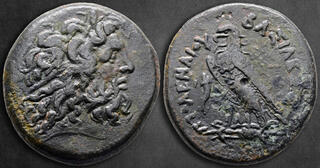Lot description:
Ptolemaic Kingdom of Egypt. Alexandreia. Ptolemy IV Philopator 222-205 BC.
Hemidrachm Æ
35 mm, 27,05 g
Diademed head of Zeus Ammon to right, with ram's horn in his hair and over the diadem / BAΣIΛE[ΩΣ] ΠTOΛEMAIOY, Eagle with closed wings standing left on thunderbolt, head right, filleted cornucopia over his shoulder; between eagle's legs, ΛI.
Very Fine
Svoronos 1128; SNG Copenhagen 203-4.
Ptolemy IV Philopator, a notable figure in the Hellenistic period, assumed the throne of Egypt in 221 BC, succeeding his father, Ptolemy III Euergetes. His name, "Philopator," signifies his affection for his father, a common practice among Egyptian pharaohs who adopted various titles and names to reflect their attributes.
During his reign, Ptolemy IV became embroiled in the ongoing conflicts between the Ptolemaic Dynasty and the Seleucid Empire, most notably exemplified by the Battle of Raphia in 217 BC. This decisive clash pitted Ptolemy IV against Antiochus III the Great of the Seleucids, with Ptolemy emerging victorious.
Ptolemy IV was not solely a warrior; he was also a patron of culture and the arts. His affinity for Greek literature and culture led to the promotion of Greek traditions in Egypt, albeit with some resistance from the indigenous Egyptian population. Amid these cultural pursuits, his reign was fraught with political instability, corruption, and a weakening of the kingdom's administration, contributing to the decline of the Ptolemaic Dynasty.
In 204 BC, Ptolemy IV's reign came to an end with his passing, and his young son, Ptolemy V Epiphanes, succeeded him. The transition of power was marred by power struggles and internal divisions within the royal court.
Ptolemy IV Philopator's legacy lies in the delicate interplay of Greek and Egyptian cultures during the Hellenistic era, his military accomplishments, and the internal challenges that foreshadowed the eventual decline of Ptolemaic Egypt.
Starting price: 50 EUR |  |